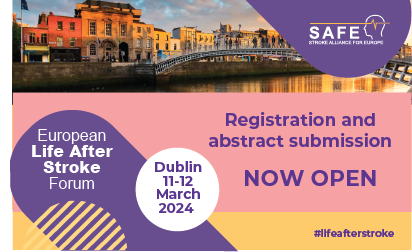
Sep 19, 2023
We are pleased to announce that our second in-person European Life After Stroke event website is now live, click here to view. Our registration and abstract submissions are also live.
Our Scientific Committee are in the process of confirming the final programme. Topics that we are likely to include are detailed below, but may be subject to change:
- What does a ‘good’ life after stroke look like?
- Reducing your risk of another stroke
- Practical tips to promote mental health
- Specific topics; managing fatigue and visual problems after stroke
We hope to see you in Dublin on the 11-12 March 2024!
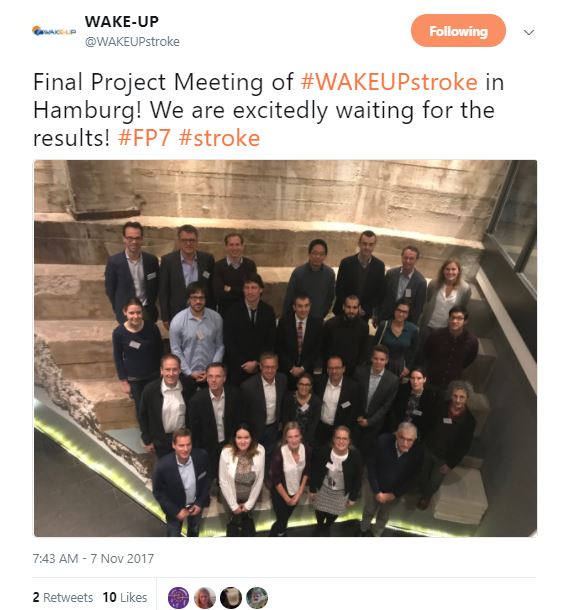
Nov 27, 2017
WAKE-UP is a European multicentre investigator-initiated randomized placebo-controlled clinical trial of MRI based thrombolysis in acute stroke patients with unknown time of symptom onset, e.g. due to recognition of stroke symptoms on awakening.
Stroke is a devastating disease leading to death and disability in large numbers of patients with massive social and economic impact. Intravenous thrombolysis with Alteplase is available as effective and safe treatment of acute stroke within 4.5 hours of symptom onset. However, in about 20% of acute stroke patients time of symptom onset is unknown e.g. because symptoms are recognized when waking-up from sleep in the morning. This large group of patients is currently excluded from treatment with Alteplase only due to the missing information on the time of symptom onset. In preparatory work the WAKE-UP consortium has developed an innovative approach of using brain MRI as surrogate marker of stroke lesion age which may be used to identify stroke patients likely to benefit from thrombolysis.
The Project started in 2013. As of June 30, enrollment in the WAKE-UP trial was stopped following a decision by the Steering Committee. By the end of enrollment, 1,377 patients were enrolled in WAKE-UP with 501 patients randomized and 876 screen failures. The final meeting was held in Hamburg, Germany, in November 2017.
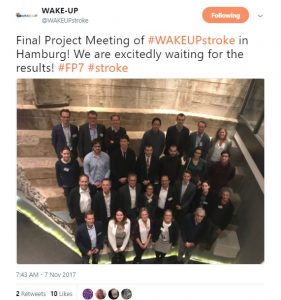 WAKE UP was led by an active and motivated consortium combining central trial management with decentralised organisation with national coordinators, with a clear communication structure and share of responsibilities, which led to the successful completion of the project.
WAKE UP was led by an active and motivated consortium combining central trial management with decentralised organisation with national coordinators, with a clear communication structure and share of responsibilities, which led to the successful completion of the project.
WAKE-UP is a European collaborative research project launched by a consortium of academic and SME partners destined to improve the treatment of stroke patients. The core of WAKE-UP is an investigator-initiated randomized controlled trial of MRI based thrombolysis in patients waking up with stroke symptoms.
The objective of WAKE-UP is to test efficacy and safety of MRI-based intravenous thrombolysis with Alteplase in patients waking up with stroke symptoms or patients with unknown symptom onset. By this, WAKE-UP aims at providing a new safe and effective treatment option for acute stroke patients waking up with stroke symptoms.
The project is centrally coordinated by the Universitätsklinikum Hamburg-Eppendorf (Prof. Christian Gerloff; deputy coordinator: Dr. Götz Thomalla).
During the WAKE UP trial, imaging software (SONIA) was developed for the purpose of this project, yet this software can also be used even when WAKE UP trial is done, for other research projects in the future.
One of the collateral benefits of this project was that clinicians/ investigators were trained in reading MRI images, providing a learning opportunity for these stroke professionals in the interpretation of MRI in acute stroke diagnostics. Almost 400 investigators from eight European countries participated in a structured software-based training.
WAKE UP trial proved to be a good example on how to involve patients who are unable to give consent.
Repeated interim analysis of safety data from the trial and evaluation by the independent Data and Safety Monitoring Board already showed that the intervention performed in this trial was proven to be safe for patients.
The final results of the main research will be presented to the public in May 2018 at ESOC 2018 conference.
For further information, please visit the Wake-Up project’s web site.
WAKE-UP – The work leading to these results has received funding from the European Union Seventh Framework Programme (FP7/2007-2013) under grant agreement n° 278276.
Please see or download WAKE-UP update in English language or in languages from the following countries:
Iceland
Hungary
Croatia
Serbia
Belgium
Germany
Slovenia
Greece
Cyprus
Spain
Georgia
Luxembourg
Israel
Netherlands
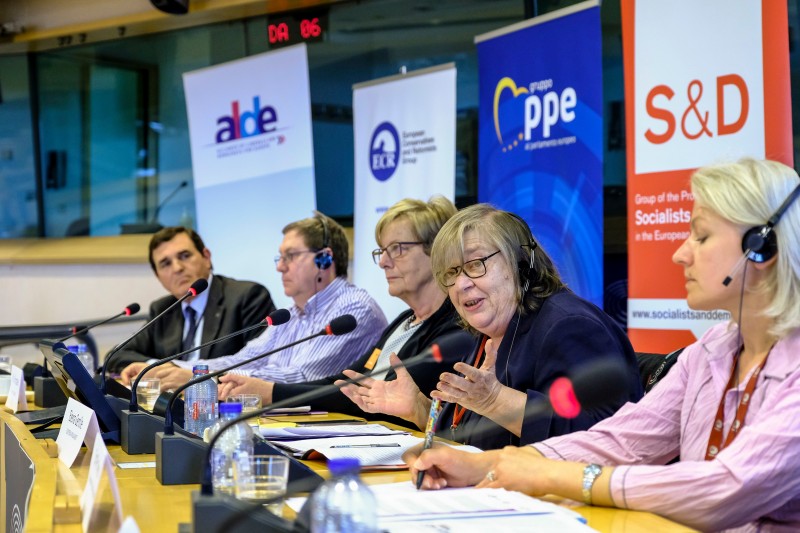
May 10, 2017
The Burden of Stroke in Europe research shows shocking disparities between and within countries along the entire stroke care pathway, with post-stroke support being neglected by all countries.
Brussels, May 11th 2017: Stroke Alliance for Europe is launching today a long-awaited, comprehensive overview of stroke care pathway across Europe. In front of dozens of members of EU Parliament, Jon Barrick, the President of SAFE and Valeria Caso, the President of European Stroke Organisation, jointly presented key findings from the research performed by King’s College London simultaneously in 35 European countries.

The event was co-hosted by four Members of the European Parliament, Elena Gentile (S&D), Marian Harkin (ALDE), Aldo Patriciello (EPP) and Helga Stevens (ECR).
-Even though the death rates from stroke in Europe have been falling over the last 20 years, stroke is a humanitarian catastrophe happening as we speak because more people are surviving stroke and more are being left with disabilities. The overall burden of stroke will rise dramatically in the next 20 years due to an ageing population. Decision-makers in Europe need to find better ways of fighting stroke and making life easier for stroke survivors and their families- said Barrick.
The projections in the Burden of Stroke report indicate that between 2015 and 2035, overall there will be a 34% increase in total number of stroke events in the European Union from 613,148 in 2015 to 819,771 in 2035.
European-wide comparisons of stroke and standardized stroke care are vital to help each country prevent stroke and provide better care and support for everyone affected by stroke.
SAFE is calling for each EU country to have national level collection and audit of stroke data. This supports the monitoring of resources and performance of systems along the whole pathway, which in turn will allow each country to learn from each other and speed up their improvement process. Many millions of people travel around Europe from country to country and it is frightening to think that they may receive excellent care in one country but in another they may die or suffer catastrophic long term disablement due to poor stroke care provision.
-The total cost of stroke in the EU of an estimated 45 billion euros in 2015 is set to rise, including both healthcare and non-healthcare costs. Projections show that the number of people living with stroke as a chronic condition will rise from 3,718,785 in 2015 to 4,631,050 in 2035, representing an increase of 25% or almost one million people across Europe. This is a huge wave coming our way and we better start to prepare for it- emphasized Barrick, adding that a joint action plan on stroke in Europe is a necessity so that the expected 34% increase in numbers of new stroke cases from 2017 until 2035 does not overwhelm national healthcare systems and those families touched by stroke.
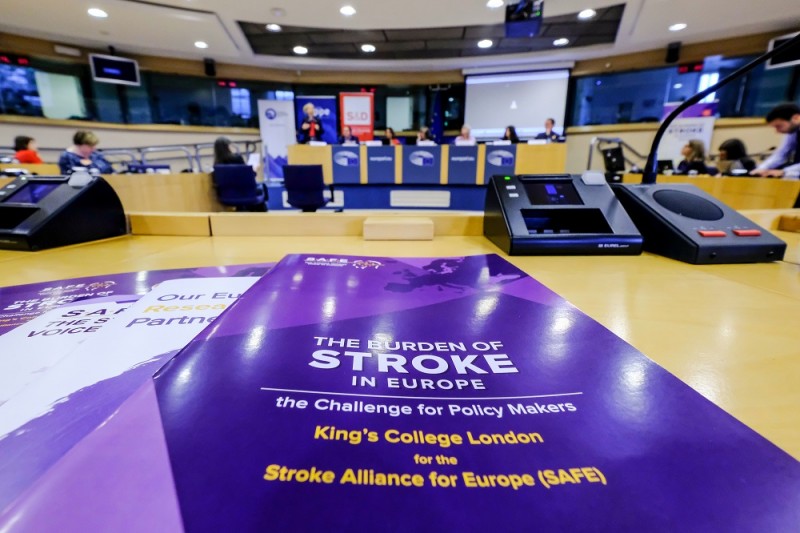
SAFE believes that the best way to fight stroke is for every EU member state to have a national stroke strategy actively supported and sponsored by the Government, that covers the whole stroke pathway, from awareness, prevention, diagnosis, treatment, transfer of care, specialist rehabilitation and reassessment, to long-term care and support, social integration and participation in community life and end-of-life care. Representatives from the wide range of professionals who support people with stroke, people who have had a stroke, carers and voluntary associations should all be involved in creating such strategies.
For more information about the Burden of Stroke Report, please visit
www.strokeeurope.eu
Sponsors of the Burden of Stroke Report:

(more…)



 WAKE UP was led by an active and motivated consortium combining central trial management with decentralised organisation with national coordinators, with a clear communication structure and share of responsibilities, which led to the successful completion of the project.
WAKE UP was led by an active and motivated consortium combining central trial management with decentralised organisation with national coordinators, with a clear communication structure and share of responsibilities, which led to the successful completion of the project.





